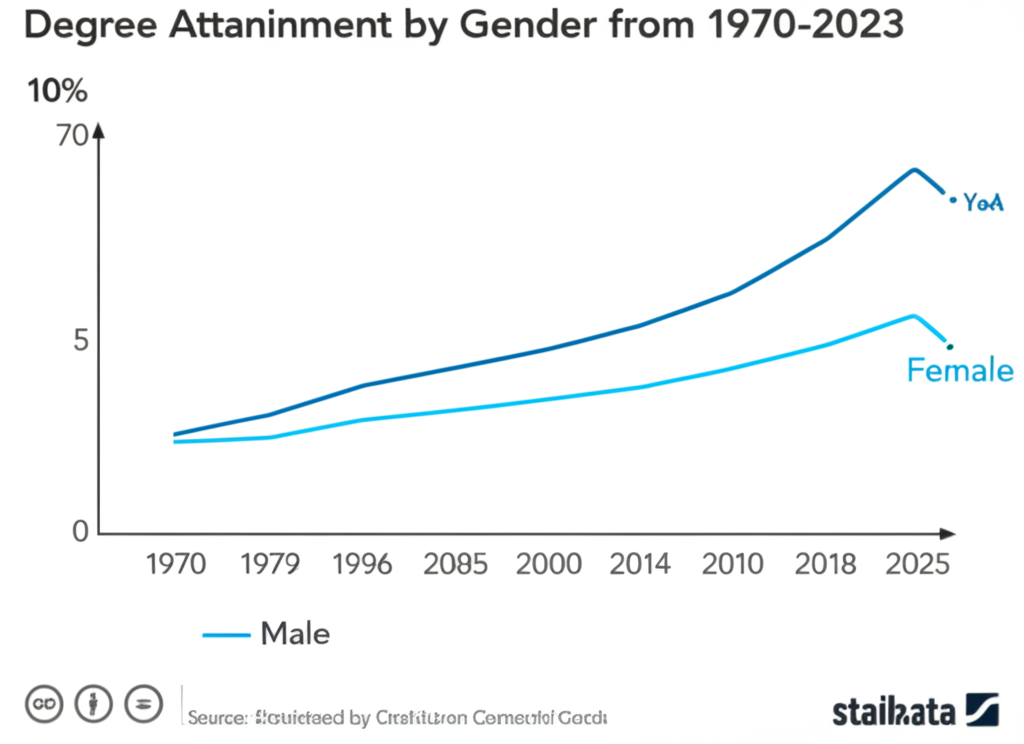The Numbers Tell the Story
The latest data from the U.S. Department of Education reveals a striking transformation in higher education demographics. In the 2022-23 academic year, women earned 58.7% of all bachelor's degrees, 62.1% of master's degrees, and 55.4% of doctoral degrees.
Degree Attainment by Gender (2022-23)
| Degree Level | Women | Men | Total Degrees |
|---|---|---|---|
| Associate | 62.3% | 37.7% | 1,025,732 |
| Bachelor's | 58.7% | 41.3% | 2,123,567 |
| Master's | 62.1% | 37.9% | 834,081 |
| Doctoral | 55.4% | 44.6% | 192,555 |
| Professional | 52.8% | 47.2% | 156,432 |
Source: U.S. Department of Education, National Center for Education Statistics
Historical Context
This represents a complete reversal from the 1970s, when men earned approximately 60% of all college degrees. The shift began in the 1980s and has accelerated over the past two decades.

The gender gap in degree attainment has reversed and widened over five decades
International Perspective
This trend is not unique to the United States. OECD data shows women now earn more degrees than men in 37 of 38 member countries, with only Turkey showing male degree dominance.
Field-Specific Analysis
While women dominate overall degree attainment, significant gender gaps persist in specific fields of study.
Fields Where Women Earn 70%+ of Degrees
- Psychology (78.2%)
- Education (79.1%)
- Health Professions (85.4%)
- Social Work (87.3%)
- Veterinary Medicine (82.1%)
- Biology/Life Sciences (62.7%)
Fields Where Men Still Dominate
- Engineering (21.8% women)
- Computer Science (19.7% women)
- Physics (20.1% women)
- Philosophy (33.2% women)
- Economics (35.1% women)
"We're seeing the most rapid evolution of English since the printing press. The question isn't whether social media is changing language—it's whether these changes enhance or diminish our ability to communicate complex ideas."
— Dr. Michael Rodriguez, Georgetown University Linguistics Department
Economic Implications
The shift in degree attainment has significant economic implications, particularly as the economy increasingly rewards higher education credentials.
Wage Gap Considerations
Despite earning more degrees, women still face a wage gap. However, the gap is narrowing among younger workers, particularly those with advanced degrees.
Factors Behind the Shift
Researchers have identified several factors contributing to women's educational advancement:
- **Academic performance:** Girls consistently outperform boys in reading and writing throughout K-12
- **College readiness:** Women are more likely to take advanced courses and participate in extracurricular activities
- **Economic incentives:** The wage premium for college education is particularly strong for women
- **Social expectations:** Changing cultural norms around women's career aspirations
- **Support systems:** Women are more likely to utilize academic support services
Concerns About Male Participation
The declining participation of men in higher education has become a policy concern, with some institutions implementing targeted recruitment and support programs.
Future Projections
Department of Education projections suggest the gender gap in degree attainment will continue to widen through 2030, with women expected to earn nearly 65% of all degrees by the end of the decade.
